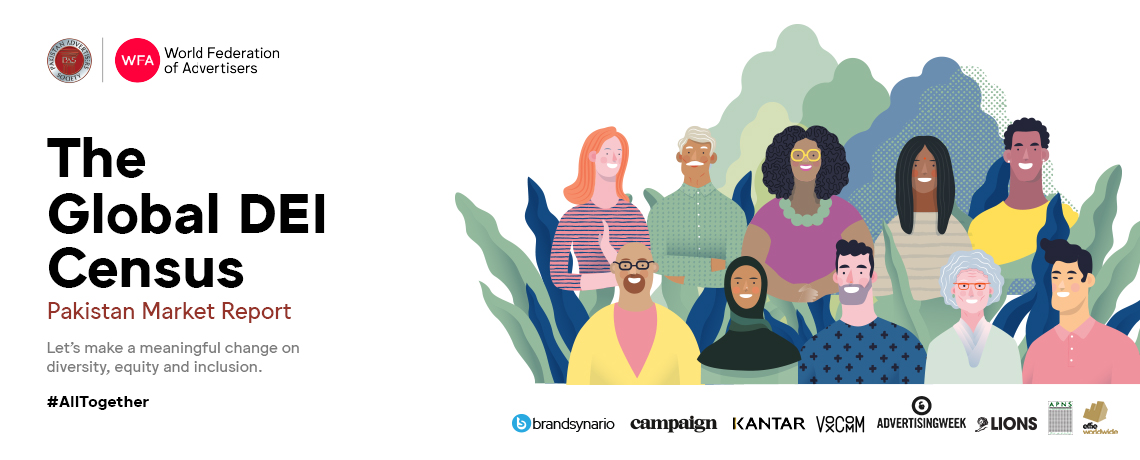- Most common forms of discrimination were reported on the basis of age and family status.
- Women and ethnic minorities in the marketing industry report poorer lived experiences than men and ethnic majorities.
- Marketing still outperformed many other industries globally on DEI.

PAS releases first-ever DEI Census that reveals major challenges around family status, age, gender, ethnicity and disability
The study has found clear gaps in lived experience when these groups were compared to the industry average, both in individual markets and globally. For example, on Kantar’s Inclusion Index, which is generated by asking questions about people’s sense of belonging, the absence of discrimination and presence of negative behaviour, men scored at 69% compared to women at 61%.
Despite these serious concerns, the marketing sector still outperformed every other category that has been analysed by research partner Kantar, scoring an overall 64% on the Inclusion Index, ahead of the next highest sector, Health and Pharmaceuticals on 60%.
The results are based on more than 300 responses from Pakistan conducted in June to July 2021 with the online survey identifying not just the demographics of participants but also their sense of belonging, experience of discrimination and demeaning behaviour.
In Pakistan, the research effort was led by PAS, while globally the World Federation of Advertisers (WFA) led the study.
The most common forms of discrimination in Pakistan identified by the survey were family status and age, with 26% agreeing that their company does not treat all employees fairly regardless of family status and 22% agreeing that their company does not treat all employees equally regardless of age. Twenty-seven per cent of respondents agreed that age can hinder one’s career while 34% of women agreed that family status can hinder one’s career.
This final statistic reflects a key finding from the Census – that women’s experiences are notably poorer than men’s. There is also strong evidence of a gender pay gap. In Pakistan, the gap is worst among senior staff with an 85% gap followed by executive management/c-suite with a 70% gap.
This is the first of its kind initiative. It is our starting point.This is more like a proof of concept, an indicative study that gives us direction. We should be cautious about drawing out too many learnings as we still need to grow the sample size, which we expect over the years says, Qamar Abbas, Executive Director, PAS. Adding, Afsheen Rizavi General Manager says the plan is to repeat the census in 2023 and see our progress. We are also aiming to establish census index on company level, so it can serve as a benchmark for you. I would urge the entire industry to join hands with us on this long overdue initiative that has long term dividends and will go a long way in making our industry more diverse and inclusive.
Other key findings include:
- In Pakistan, the lived experiences of people with disabilities are way better than some but not all markets. In Pakistan, 1% of disabled respondents say they have faced discrimination based on disability and they also tend to score lower against “feel like I belong at my company” than non-disabled respondents.
- In Pakistan, sense of belonging varies widely. Women and those with disabilities have a lower sense of belonging compared to their colleagues.
- Most reported that their organisations are taking active steps to address diversity and inclusion. The majority of respondents feel their company is working hard to become more diverse and inclusive, with 56% of respondents agreeing. Out of 56% respondents, 52% of the women and 59% of the men respondents believe that their company is actively taking measures to be more diverse and inclusive.
- There are huge variations generally between markets. When looking across all scores, Belgium scored highest of the 27 markets surveyed in Kantar’s Inclusion Index at 74%. But one of the starkest learnings from the survey is the extent to which some countries reported figures significantly below the global averages when it comes to the absence of discrimination and presence of negative behaviours. This is particularly noticeable when it comes to reviewing the responses from women in these same markets. These differences also corroborate systemic issues in some countries where there have been longstanding societal problems around gender, race and/or ethnicity.
For press enquiries please contact Afsheen Rizavi at secretariat@pas.org.pk
